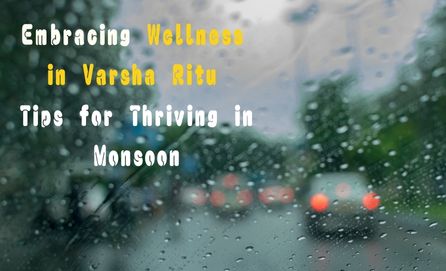“आदानग्लानवपुषामग्निसन्नोऽपि सीदति वर्षासु दोषदुष्यन्ति तेऽम्बुलम्बाम्बुदेऽम्बरे सतुषारेण मरुता सहसा शीतलेन च भूबाष्पेणाम्लपाकेन मलिनेन च वारिणा ।। वह्निनैव च मन्देन, तेष्वित्यन्योऽन्यदूषिषु भजेत्साधारणं सर्वमूष्णस्तेजनं च यत्।”
The digestive activity, or Agni, is low during the rainy season. Adana Kala has already weakened it; the Doshas cause it to weaken even more and vitiate it. The effects of heavy clouds carrying water, chilly winds carrying snow, contaminated water from rain, earth’s warmth, and sourness exacerbate the Doshas. Numerous ailments are caused by the weakening of digestive action and the Doshas, which begin to vitiate each other. As a result, it is important to take all general steps to reduce Dosha imbalance and increase digestive function.
The monsoon, or Varsha Ritu, is a season of rejuvenation and renewal, but it also brings with it challenges for our health and wellness. Embracing wellness during this season requires mindful practices and a balanced approach to our daily routines. Here are some essential tips to help you thrive in the monsoon, especially for those in Pune, where the rains are both a blessing and a challenge.
Balancing Doshas and Their Effects on the Body
During Varsha Ritu, the body’s Doshas—Vata, Pitta, and Kapha—tend to get imbalanced, leading to various health issues. It’s crucial to understand how to balance these Doshas to maintain good health.
- Vata Dosha: This increases during monsoon, leading to digestive issues, joint pains, and dry skin. To balance Vata, consume warm, oily, and easily digestible foods.
- Pitta Dosha: Although generally pacified by the coolness of the rains, Pitta can still be aggravated by the humidity. Avoid spicy and sour foods.
- Kapha Dosha: Monsoon tends to aggravate Kapha, causing colds, coughs, and congestion. Opt for light, warm, and spicy foods to keep Kapha in check.
Ayurvedic Dinacharya for a Balanced Monsoon Season
Adopting an Ayurvedic daily routine (Dincharya) can help maintain balance and wellness.
- Morning Routine: Start your day with a glass of warm water to aid digestion. Perform oil pulling and tongue scraping to detoxify.
- Exercise: Engage in moderate exercise like yoga or walking to keep your body active.
- Diet: Eat freshly prepared, warm meals that are easy to digest. Include spices like ginger, turmeric, and black pepper to enhance digestion and immunity.
The Therapeutic Touch of Massages During Varsha Ritu
Massages are particularly beneficial during the monsoon. Ayurvedic massages with warm herbal oils can help pacify aggravated Vata and Kapha Doshas, improve circulation, and detoxify the body. Consider visiting a spa center in Pune, such as Yash Ayurvedic Spa or Blue Bliss Spa, for a therapeutic massage experience that can enhance your overall well-being.
Skin and Hair Care Do’s and Don’ts for Varsha Ritu
The increased humidity during the monsoon can lead to various skin and hair issues. Follow these do’s and don’ts to keep your skin and hair healthy:
- Do’s: Use natural cleansers and moisturizers to keep your skin hydrated. Wash your hair regularly with a mild shampoo and use a conditioner to combat frizz.
- Don’ts: Avoid heavy makeup and oil-based products that can clog pores. Refrain from using harsh hair treatments that can lead to dryness and breakage.
Navigating Varsha Ritu with Mindful Practices
Mindfulness plays a significant role in maintaining health during the monsoon. Practice meditation and deep breathing exercises to reduce stress and improve mental clarity. Ensure you get adequate rest and sleep to support your body’s natural healing processes.
By incorporating these tips and practices into your daily routine, you can embrace wellness and thrive during Varsha Ritu. Remember, maintaining a balanced approach to your diet, exercise, and self-care rituals is key to navigating the challenges of the monsoon season.For more information on finding the best spas in Pune for your monsoon wellness journey, visit Spa Center, a comprehensive spa registration and business listing site
